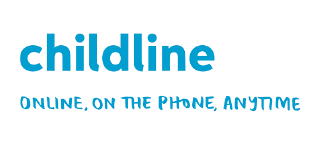
Childline
Childline is a free, private and confidential service where you can be you. Whatever your worry, whenever you need help, however you want to get in touch.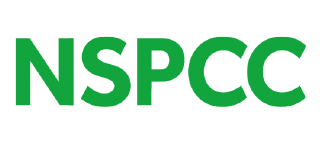
NSPCC
The NSPCC are the leading children’s charity fighting to end child abuse in the UK.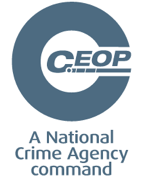
CEOP
CEOP are here to help if something has happened online which has made you feel unsafe, scared or worried.
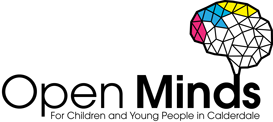
Open Minds
Open Minds will help you with questions about emotional health and wellbeing, showing you where you can find support.

Kooth
Kooth is a free, safe and anonymous online support for young people
Fearless
Fearless is a website where you can access non-judgemental information and advice about crime and criminality including myths and facts on topics such as knife crime, county lines, and robbery.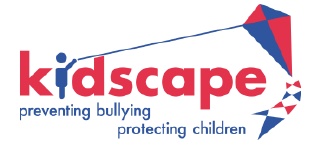
Kidscape
The vision of Kidscape is for all children to grow up in a world free from bullying and harm, with adults who keep them safe and help them to reach their full potential.
Shore
Shore is a safe space for teenagers concerned about their own or someone else’s sexual thoughts and behaviour. Shore has anonymous advice and support to help you or someone you know manage worrying thoughts. All services are anonymous.
Centre Point
Centrepoint is a safe space for young people to build an independent future. We provide the expert support and secure housing that young people need to reclaim their dreams and have a future beyond homelessness
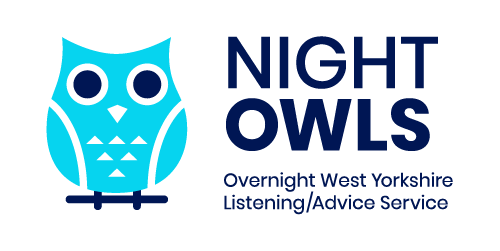
West Yorkshire Night OWLS Helpline
West Yorkshire Night OWLS is a confidential support line for children, young people, their parents and carers, in a crisis. If you are concerned about their emotional wellbeing contact Night OWLS.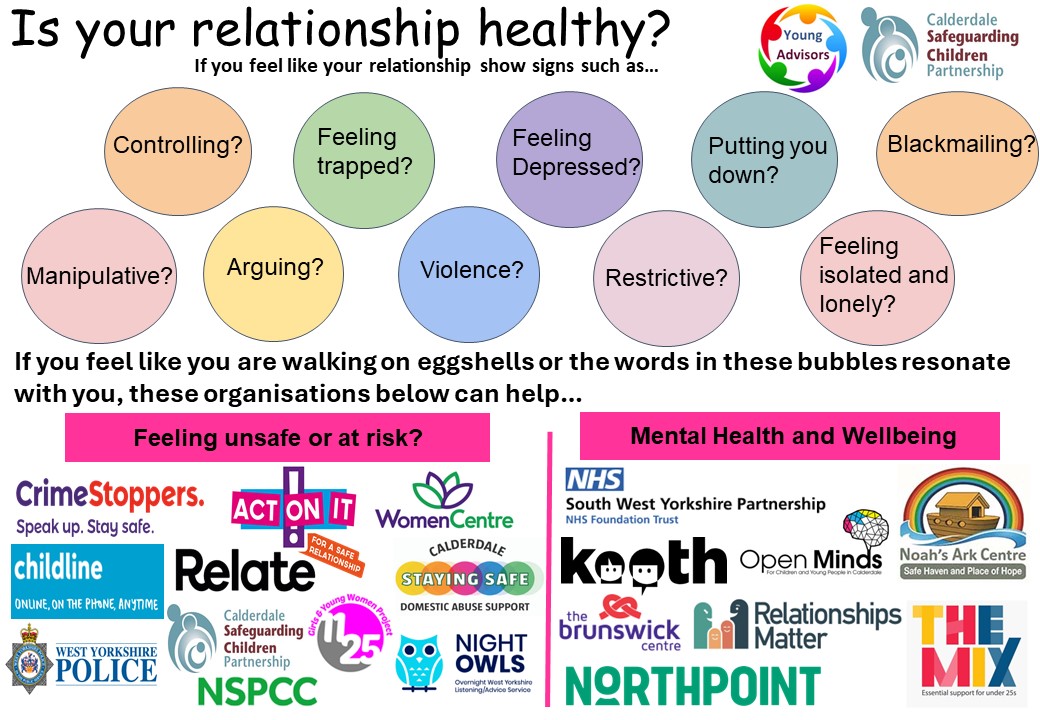
This wonderful poster was created by Calderdale Young Advisors, please feel free to download and share the poster.
They also conducted a survey with children and young people in Calderdale on this subject of Healthy Relationships and you can watch them presenting their findings here.
Calderdale Young Advisors, talk about their role and invite you to join them
More topics and resources
Abuse
What is abuse
Abuse can be broken down into four types:
- Physical Abuse: when a grown up hurts you on purpose, for example: hitting, shaking, burning and suffocating.
- Emotional Abuse: this could be things such as being ignored on purpose, called names and getting unfairly blamed for lots of things.
- Sexual Abuse: this could be being forced to take a rude photo or take part in sexual activities.
- Neglect: when you are not looked after properly by your parents/carers. For example: not getting enough food and drink.
If you or someone you know is being abused, it is important you let the right people know. You can report a concern on this website.
This power point presentation provides more information about Types of Abuse. You can also visit What is Child Abuse? | NSPCC
Domestic Abuse
If you are a child or young person reading this and you live with violence or abuse at home, please keep reading. You are not alone.
Online Safety
Calderdale Special Educational Needs or Disabilities (SEND) Reference Group’s Top 10 Tips to stay safe online:
- Don’t add people just for followers
- Don’t post personal information online
- Watch what you look at and post online, stay safe and report inappropriate content
- Don’t send nudes, it’s a criminal offence
- Be careful about what you post online
- Don’t share your passwords with anyone
- Set your social media profiles to private so that random people can’t message you
- Go online for positive use only and be aware of negative behaviour such as bullying
- Be careful which websites you go on
- Be aware that there are possible dangers online such as fake accounts and people who lie about who the really are.
Childline has lots of information on how to stay safe online.
You can report concerns about online safety to CEOP.
Skips Safety Net also has a range of free resources and tools
Child Exploitation
There are different forms of Child Exploitation in the UK, including Child Sexual Exploitation and Criminal Exploitation. You may have also heard of County Lines. Here is some useful information and links to help you understand more about the different forms of Child Exploitation.
Child Sexual Exploitation
Child sexual exploitation (CSE) is a type of sexual abuse. It happens when a child or young person is coerced, manipulated or deceived into sexual activity in exchange for things that they may need or want like gifts, drugs, money, status and affection.
Please visit NSPCC website for more information on Child Sexual Exploitation
Child Criminal Exploitation and Gangs
Children and young people involved with gangs and criminal exploitation need help and support. They might be victims of violence or pressured into doing things like stealing or carrying drugs or weapons. They might be abused, exploited and put into dangerous situations.
Please visit NSPCC website for more information on Criminal exploitation and gangs
Missing
Homelessness
Being homeless means not having a safe place to call home. Many young people sleep rough every night, but there are thousands more sleeping on sofas, floors, or with strangers; this is called Sofa Surfing.
For more information on youth homelessness, please visit Centre Point.
Calderdale Young Advisors conducted a survey with Young People in Calderdale to find out what they knew about Homelessness and Sofa Surfing. Please watch their video on Homelessness and Sofa Surfing.
Private fostering
There may be many reasons why you are not living at home, it may be just your parent has had to go into hospital for a long stay, or your parents may be working or living in another country.
If you think you are living with private foster carers and want to talk to someone for help and advice, please contact:
Multi-Agency Screening Team (MAST) on 01422 393336 or for more information, read this leaflet Private fostering young people
Bullying
Bullying includes:
- People calling you names
- Making things up to get you into trouble
- Hitting, pinching, biting, pushing and shoving
- Stealing from you
- Damaging your belongings on purpose
- Taking your friends away from you
- Spreading rumours
- People threatening you, or being intimidating
- Cyber bullying – anything that is online such as Facebook or Email
For help and advice on how to cope with bullying, visit the Childline website.
Bereavement Support
Everyone experiences loss and bereavement differently and copes in their own way. Feeling sad, scared, shocked, angry, or even feel nothing at all are normal emotions, there is no right way to feel.
Sometimes, speaking to a professional about how you’re feeling could help.
Please visit Open Minds for advice and guidance to help support you at this very difficult time.
Substance Misuse
There are many reasons why someone might drink alcohol or take drugs.
Young Minds has a useful guide, containing facts, advice and information on drugs and alcohol, and how they can affect your mental health.
If you are:
- aged between 10 to 21 and living in Calderdale
- worried about either your drug and alcohol use or someone else’s
Please visit Calderdale Branching Out
If there is any information missing from this page, please contact Sophie.Wrafter@Calderdale.gov.uk

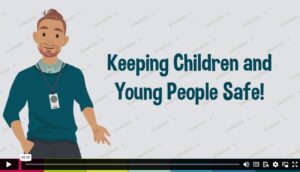
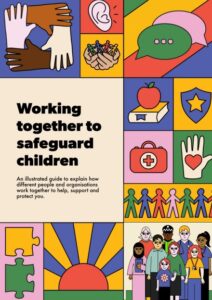
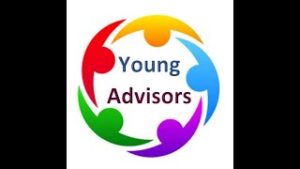 Click to watch
Click to watch